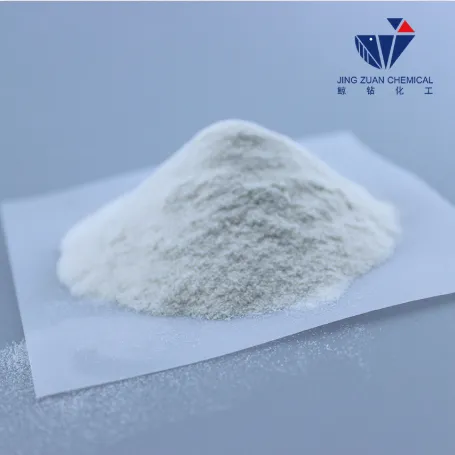
feb . 21, 2025 16:04 Tilbage til listen
HPMC Solubility: Water-Soluble and Temperature-Dependent
Hydroxypropyl Methylcellulose (HPMC) is a versatile polymer known for its excellent solubility in water. Depending on the specific grade, HPMC can dissolve in both cold and hot water, making it an ideal choice for various industries, from construction to pharmaceuticals.

When HPMC is mixed with cold water, it dissolves readily, forming a clear, viscous solution. This property is particularly useful in applications that require a thickening agent or binder, such as in paints, coatings, and adhesives. The cold water solubility also makes HPMC suitable for use in personal care products like lotions and shampoos, where a smooth, gel-like consistency is required.
However, the solubility of HPMC in water is temperature-dependent. In hot water, HPMC dissolves even more efficiently, allowing for a broader range of applications. The ability to adapt to varying temperatures makes HPMC a flexible polymer, essential in both industrial and consumer product formulations.
HPMC Safety: Non-Toxic and Eco-Friendly
One of the standout features of HPMC is its excellent safety profile. It is considered non-toxic, non-irritating, and is safe for use in a wide variety of applications, including those in the pharmaceutical, cosmetic, and food industries.
Since HPMC is derived from natural cellulose, it is considered environmentally friendly, with a biodegradable nature that reduces its environmental footprint. This makes it an excellent choice for manufacturers who prioritize sustainability in their products. Additionally, HPMC is safe for skin contact, making it a widely used ingredient in personal care formulations like lotions, creams, and hair products. Its safety and non-reactive properties also extend to medical applications, such as in tablet coatings and as a binder in drug formulations.
HPMC Products: A Diverse Range for Every Need
The range of HPMC products available today is vast, with each grade offering different properties depending on the needs of the application. From construction to pharmaceuticals, HPMC serves as a versatile component that helps enhance the quality of a wide variety of formulations.
In the construction industry, HPMC is commonly used as an additive in mortar, plasters, and tile adhesives, where its water retention properties improve workability and bonding. Its ability to dissolve in both cold and hot water makes it easy to incorporate into various formulations.
In pharmaceuticals, HPMC is utilized for its binders and controlled-release formulations, as it can form gels and act as a stabilizer in oral dosage forms. Similarly, in the food industry, it functions as a thickening agent and emulsifier.
HPMC is also widely found in the cosmetic industry, where it contributes to the texture, viscosity, and stability of creams, lotions, and gels. Its use as a thickening agent in shampoos and conditioners ensures that these products maintain their consistency and effectiveness.
HPMC Polymer: A Multifunctional Additive
As a polymer, HPMC brings multiple benefits across industries due to its versatile nature. One of the key advantages of HPMC polymer is its ability to control the viscosity of a solution. This is especially important in applications where the desired thickness or flow is critical, such as in paint formulations, pharmaceutical suspensions, and cosmetic products.
Furthermore, HPMC polymer is used to enhance the adhesion and workability of various materials in construction and building applications. The water retention properties of HPMC ensure that materials like mortar and plaster stay workable for a longer time, making them easier to apply and allowing for a more uniform finish. This is particularly useful in hot climates or areas with high air circulation, where materials often dry too quickly.
The HPMC polymer is also a great stabilizer for emulsions and suspensions. Whether you're creating food emulsions, pharmaceutical suspensions, or even cosmetic creams, the polymer’s ability to prevent separation or clumping ensures a smoother, more stable final product.
The Right HPMC for Every Application
Given the range of benefits, it’s crucial to choose the right HPMC grade for your application. With its solubility in water, non-toxic nature, and wide range of uses, HPMC is a staple in many industries. Whether you're looking for a thickening agent, binder, or stabilizer, HPMC products offer the versatility and performance you need.
If you’re in need of high-quality HPMC for your next project, look no further. Our extensive selection of redispersible powder, HPMC products, and polymers are designed to meet your unique needs and elevate your formulations. Visit our website today to learn more about how HPMC can enhance your products and make the mixing process a breeze.
-
Versatile Hpmc Uses in Different Industries
NyhederJun.19,2025
-
Redispersible Powder's Role in Enhancing Durability of Construction Products
NyhederJun.19,2025
-
Hydroxyethyl Cellulose Applications Driving Green Industrial Processes
NyhederJun.19,2025
-
Exploring Different Redispersible Polymer Powder
NyhederJun.19,2025
-
Choosing the Right Mortar Bonding Agent
NyhederJun.19,2025
-
Applications and Significance of China Hpmc in Modern Industries
NyhederJun.19,2025







